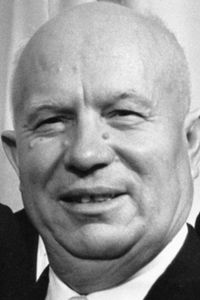Nikita Sergeyevich Khrushchev was a pivotal figure in Soviet history, serving as the First Secretary of the Communist Party of the Soviet Union from 1953 to 1964, as well as the chairman of the country's Council of Ministers from 1958 to 1964.
Born on April 15, 1894, in Russia, Khrushchev's early life was marked by poverty and hardship. Despite these challenges, he rose through the ranks of the Soviet Communist Party, becoming a prominent figure in the 1940s and 1950s.
As First Secretary, Khrushchev shocked the communist world by denouncing the atrocities committed by his predecessor, Joseph Stalin. This bold move marked the beginning of de-Stalinization, a period of reform that aimed to distance the Soviet Union from Stalin's brutal legacy.
Under Khrushchev's leadership, the Soviet Union made significant strides in space exploration, sponsoring the early Soviet space program and achieving a number of notable milestones. He also implemented relatively liberal reforms in domestic policy, seeking to improve the lives of Soviet citizens.
However, Khrushchev's tenure was not without controversy. His impulsive nature and tendency to act on instinct often led to reckless decisions, including a narrowly avoided nuclear war over Cuba. Despite these challenges, Khrushchev was able to conduct successful negotiations with the United States, reducing Cold War tensions and paving the way for greater cooperation between the two superpowers.
Ultimately, Khrushchev's proclivity for recklessness and his inability to work effectively with other members of the Kremlin leadership led to his downfall. In 1964, he was stripped of power and replaced by Leonid Brezhnev as First Secretary and Alexei Kosygin as Premier.
















































